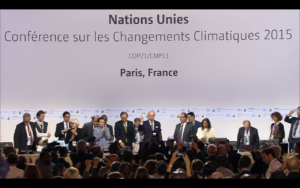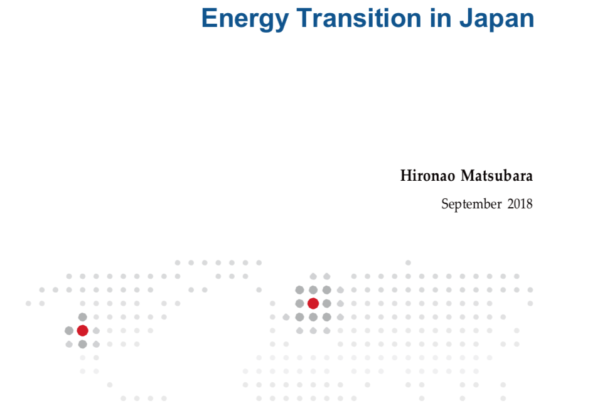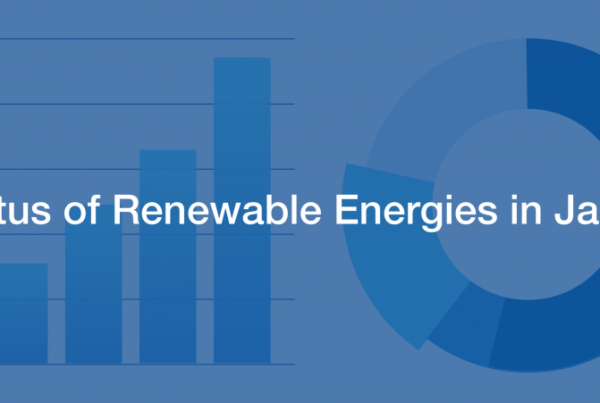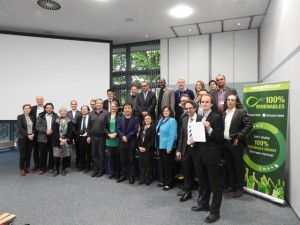
The adoption of the Paris Agreement at COP21, UNFCCC
On the adoption of the COP21 Paris Agreement
At the COP21 (21stsession of the Conference of the Parties to the Framework Convention on Climate Change) held in Paris, France, from November 30 to December 12, 2015, the representatives from the 196 attending countries and regions agreed unanimously to adopt the Paris Agreement, a new legal framework for measures against climate change after 2020, in order prevent destructive climate change due to greenhouse gasses emitted by human economic activity.
In order to keep the rise of the world’s surface temperature to less than 2ºC and, furthermore, to aim for less than 1.5ºC by the end of the 21stcentury, compared to before the Industrial Revolution, the Paris Agreement requires a long term target of approaching zero emissions of greenhouse gasses from fossil fuels, etc. by the middle of the 21stcentury. In particular, the Paris Agreement has the first statement of the importance of renewable energy for access to energy by the nations of Africa.
However, if the targets that various countries have submitted so far are added up, the temperature will go far over 2ºC so the revision every 5 years from now on and the strengthening of efforts in each country are important. It’s necessary to switch to 100% renewable energy in order to not only reorganize from a large energy consumption society to a low energy consumption society but, also, at the same time, to realize a carbon-less society which has moved away from a supply system dependent on fossil fuels and nuclear power.
From the initiatives announced at COP21 by the many organizations, municipal governments and businesses, we can say that the movement to 100% renewable energy is becoming a large wave around the world. In Paris, close to 1,000 participants from around the world gathered for the Local Leaders Climate Summit and they declared to reduce CO2 emissions 80% by 2050 and aim for a goal of 100% renewable energy as a long term goal. Also, 53 international corporations, such as Google and IKEA, also are already aiming to realize 100% renewable energy. There are also many international renewable energy-related initiatives starting up, such as the Global Geothermal Alliance, which was established by 36 countries from Europe, America, and Africa which have a wealth of geothermal resources where the advanced countries will work to co-develop geothermal energy with developing countries.
All the countries of the world, not only the countries advanced in renewable energy, but also the developing countries, are preparing to confront this difficult problem of climate change by having renewable energy as the pillar in the fundamental switch from the fossil fuel-dependent society we’ve had until now. Now is certainly the time for Japan to re-consider its lagging energy policies and stand in the forefront of the switch to 100% renewable energy for sustainable energy and move toward solving the world-wide climate change problem.
Following on the adoption of the COP21 Paris Agreement, the Institute for Sustainable Energy Policies (ISEP) makes the statements below to aim for 100% renewable energy.
1. Make Renewable Energy the Mainstream Form of Energy
It goes without saying that a fundamental change to the energy supply system is necessary in order to reduce the amount of climate-change-inducing greenhouse gasses that are emitted. Of course, the center of measures against climate change are increased energy efficiency and conservation of energy but, it is also necessary to make renewable energy the main source of energy.
Renewable energy, which has solar energy, wind, hydro, geothermal, and biomass as its origins, can be used equitably around the world, it is a democratic energy in which anyone can participate, it contributes to the energy independence and economic independence of regions and countries, its adoption is actually growing rapidly, it is a clean resource that can be used forever and, since it is the only energy which can be used sustainably, it should be the mainstream source of energy.
2. Don’t Rely on CCS and Nuclear Power Which Have Poor Prospects of Being Realized
In some counties, nuclear power is thought of as one of the ways of countering climate change but the March 11 Fukushima Daiichi Nuclear Power Plant accident made it clear that this has great risk (terrible accidents, nuclear waste, nuclear proliferation, etc.). Also, the realization of Carbon Collection and Storage (CCS) is still a huge technical difficulty and, with the liberalization of energy it’s even necessary to reduce the number of coal-fired power plants being considered in Japan and other countries, building new ones would clearly hurt the realization of climate change policies. With the risk of investment and the non-democratic character of these energy sources they are, in fact, not proceeding and are not energy types that should be pursued.
3. Aim for 100% Renewable Energy in a Bottom-up Approach Led by Regions and with Citizen Participation
Each country and region should aim for 100% renewable energy as a long-term measure against climate change. With regards to renewable energy, which is the only sustainable source of energy, we, at the Institute for Sustainable Energy Policies (ISEP), support projects in various regions aiming for 100% and are a founding partner of Global 100% RE2and are participating in various activities.
A bottom-up approach, with citizen participation and region leadership, is particularly important. At the Prefecture level, Fukushima and Nagano Prefectures are already aiming for 100% renewable energy and the Community Power project, which is a project where regions around the country take the initiative on renewable energy, is expanding.
4. Agreement on Ambitious Targets for Climate Change Countermeasures
IPCC’s Fifth Assessment Report clearly shows a feeling of crisis regarding the threat of climate change and clearly shows that it is an urgent issue for all the countries of the world. First, the Japanese government and the regional municipalities must clearly indicate a path to realize the long-term goal of 80% reductions of greenhouse gasses by 2050, which was decided on by the Cabinet, and raise the insufficient emissions target of 26.0% (by fiscal 2030, compared to 2013) indicated in the INDC of July, 2015 to a fair and ambitious target (at least 40%, compared to 1990) to attain the less than 2ºC which has been agreed to by the governments of the various countries.
On top of that, a concrete roadmap of global warming countermeasures must be made clear and the nation and regional municipalities must re-consider the fundamentals of energy policies in general. Based on that, we strongly call for the governments of each country to draw up high reduction targets and for all stakeholders to participate and undertake concrete measures against global warming.
References:
- COP21 UNFCCC (UN Framework Convention on Climate Change) website: http://unfccc.int/2860.php
- World Future Council “Despite a weak outcome: Paris was first “renewables COP”
- RE100, 2014 http://there100.org/companies
- Global Geothermal Alliance, 2015 “Joint Communiqué on the Global Geothermal Alliance”
- Global 100% RE, http://www.go100re.net/
- International Community Power Conference 2014 in Fukushima
- CAN-Japan “Climate Action Network Japan”





